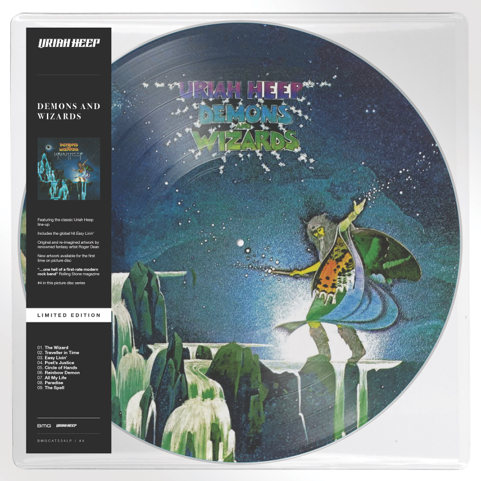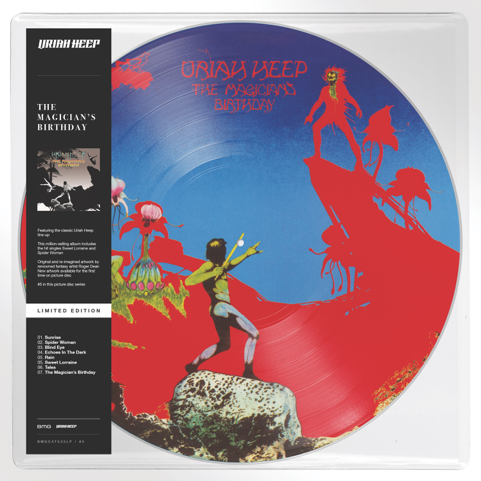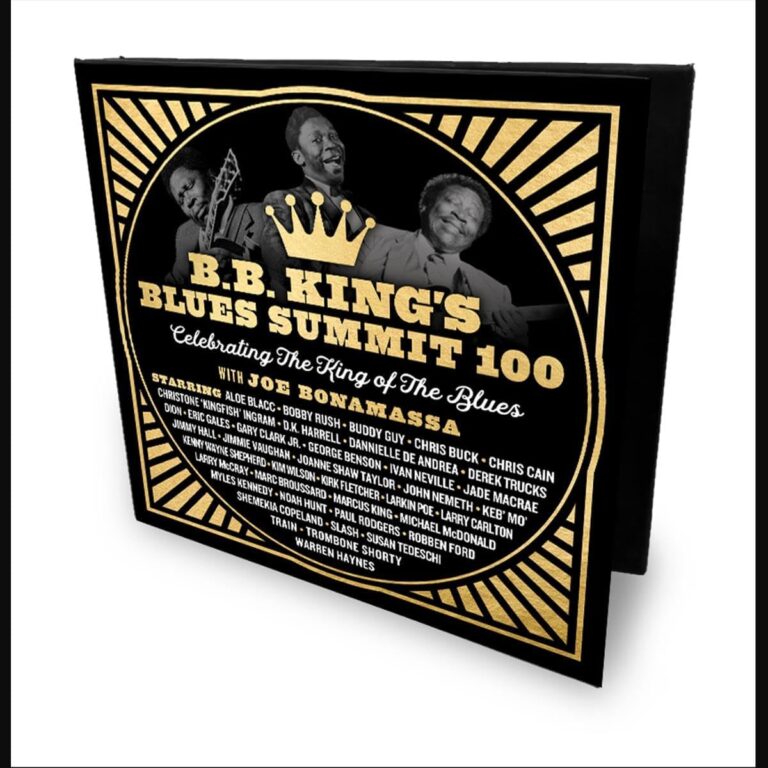
Following on from the gorgeous picture disc versions of Very ‘Eavy Very ‘Umble and Salisbury (reviewed here), BMG continue their series of Uriah Heep reissues with Demons and Wizards and The Magician’s Birthday. Overlooked for the time being (although a space has been left in the running), 1971’s Look At yourself may be a fine album, but it has a pretty horrible cover. These albums, however, are among the most striking in the Heep catalogue. Very different from what had gone before, they feature Roger “Yes” Dean’s immersive artwork, evoking a sense of mystery and progressive grandeur that neatly reflects the musical content of the albums.
As with the first two releases in the series, both albums come in simple, clear plastic sleeves, with stickers bearing basic album details – track listing, cover art and a tiny preamble introducing the album. It is a clean, uncluttered look that allows maximum space for the picture disc itself, although the sticker for The Magician’s Birthday does contain a misprint that shows two track 5s and only seven tracks total. Nevertheless, the expectation is that these gorgeous pressings are aimed at fans looking to expand their collection with a collectible artefact and, in that, these editions succeed admirably. Both platters are rock solid and beautifully presented and, if there is some light surface noise (The Magician’s Birthday proving the cracklier of the two, perhaps because of the more ambitious sleeve art), the sound is otherwise very clear and sharp, and fans will surely enjoy reacquainting themselves with these ambitious outings via a rather special format.

Released in early 1972, Demons and Wizards was the more successful album upon release. Where Uriah Heep had suffered the slings and arrows of the critics’ hatchets on their earlier work (Rolling Stone offered a bafflingly negative review of the band’s debut), the band’s critical fortunes rose sharply on this, their fourth record, and it remains a fan favourite to this day.
Even at a remove of some fifty years, it’s easy to understand the popularity of the album from the moment the richly detailed acoustic introduction to The Wizard opens proceedings. There’s a depth to the production which has not dated at all in the intervening years, and the arrangement draws in bluesy riffs, progressive flourishes and massed vocal harmonies. It’s a stunning opening and it’s more than matched by the experimental ardour of Traveller in Time, which pairs a funky bassline with some truly unearthly sound effects. Not that the band had lost their ability to simply rock, as the evergreen might of Easy Livin’ clearly shows. Rather more nuanced, the wah-inflected guitars and harmony vocals of Poet’s Justice settles the pace after the adrenalin rush of its predecessor, before the first side spins to a halt with the progressively phrased Circle of Hands. Featuring some impressive lead guitar work, and a springy bassline that gives the track a certain energy, it is a slightly wistful, yet engaging piece of music.
Opening side two, the dense layers of organ that introduce Rainbow Demon fires the senses, the band engaging in a sort of darkened prog that sounds like Pink Floyd going head-to-head with The Doors and Deep Purple. With a very different vibe, the surging All My Life taps into a similar vein of inspiration to Led Zeppelin’s latter-day output before the band head back into acoustic territory with the rather lovely (and aptly named) Paradise. A subtle, heartfelt lament, Paradise is a gorgeous piece of music with a Bowie undercurrent, and it neatly paves the way for album closer The Spell. A grandiose finale with Gilmour-esque moments, and a sweeping sense of mystery, it brings a remarkable album to a remarkable close.
Regularly named as one of Uriah Heep’s most impressive achievements, Demons and Wizards remains a fantastic piece of work, which flows beautifully across its eight songs. With Roger Dean’s mesmerising artwork, Demons and Wizards is not only a brilliant Heep album, but also an essential addition to any music fan’s collection. 9.5/10

Unbelievably released in the same year as its predecessor, The Magician’s Birthday is a concept album based, albeit rather loosely, on a short story written by the band’s keyboardist, Ken Hensley. Unlike Demons & Wizards, which met with considerable critical success, the reaction to The Magician’s Birthday was rather more muted, although time has been kind to the album’s progressive excursions, especially the ten-minute long title track.
The album opens strongly, with the fluid grace and rock operatics of Sunrise. However, follow up Spider Woman is rather more whimsical. While it may be typical Heep rocker, complete with slide guitar and gritty vocals, the over-repeated title that forms the chorus undermines its power, and it feels a touch throwaway. Things get back on track with the harmonised lead guitars of Blind Eye. Driven by the acoustic guitar and with tightly coiled, folky vocals, it’s a strong piece of music that stands shoulder to shoulder with the material found on Demons and Wizards. Next up, the stunning Echoes in The Dark is both an album highlight and a genuine Heep classic. With its hefty riff and subtle lead work, it travels a similar road to Meddle-era Floyd, Uriah Heep bringing their own hard rock sensibilities to the mix. It’s a genuinely powerful moment and it leaves only the short, sweet Rain to bring the first side to a close.
Side two opens suddenly, with the haunted oscillators and funky guitar figures of Sweet Loraine, and it feels a bit of a shock after the gentle Rain. This is one of those times where you can clearly see the vinyl mindset at work in an album’s sequencing and, without the need to flip the side, the track would surely have come as too great a shift when heard on CD. Here, however, it serves to vigorously kickstart a side that features only three songs. A short, atmospheric piece of music, Tales sees the Heep sitting upon the ground, telling sad stories of the death of kings, essentially paving the way for the ten-minute title track. Things start simply enough, as the band kick out the sort of bluesy riff that Mick Box can write in his sleep. Very quickly, however, the band’s imagination starts to run free and the track flows freely into a variety of different realms. As David Byron cries out “Let the orchestra play,” so we find ourselves at a rather disconcerting birthday party, complete with kazoos, birthday greetings and multi-part vocals and it only gets stranger from there. It’s a strikingly original composition, reminiscent of Genesis (who released the feted Foxtrot the same year), with its rich vein of twisted theatricality and inspired musicianship.
While The Magician’s Birthday may not be as consistently brilliant as Demons and Wizards, it suffers more in the comparison than when heard as a standalone effort, and you can only wonder how much more successful it might have been, had it been released a few months later and with a more markedly different cover. Now rightly respected, it contains a number of incredibly strong songs, not least the title track and the stunning Echoes in the Dark, highlighting just how inspired Uriah Heep were are this period in their career. 8.5/10
Leaving aside the music for a moment, when it comes to special, picture disc reissues, not every album is suited to the format for obvious reasons. However, with Roger Dean providing some beautifully psychedelic art for both Demons and Wizards and The Magician’s Birthday, these two pressings are likely to be the most desirable (and thus hardest to find) from the set. That they happen to be two of the Heep’s most consistently inventive and impressive albums only adds to their desirability, and both outings come highly recommended.



